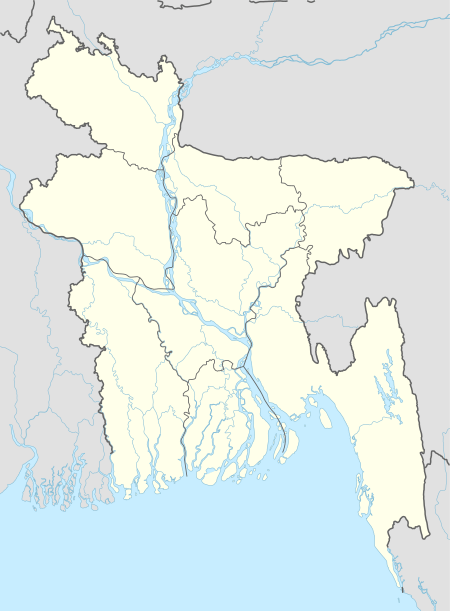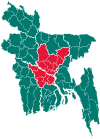Tungipara Upazila
Tungipara (Bengali: টুংগীপাড়া) is an upazila of Gopalganj District in the Division of Dhaka, Bangladesh.[1] It is the birthplace of Sheikh Mujibur Rahman, considered Father of the Nation and founder of independent Bangladesh.
Tungipara টুংগীপাড়া | |
|---|---|
Upazila | |
 Tungipara Location in Bangladesh | |
| Coordinates: 22°54′N 89°53′E | |
| Country | |
| Division | Dhaka Division |
| District | Gopalganj District |
| Area | |
| • Total | 127.25 km2 (49.13 sq mi) |
| Population (1991) | |
| • Total | 88,102 |
| • Density | 692/km2 (1,790/sq mi) |
| Time zone | UTC+6 (BST) |
| Website | Tungipara Upazila |
Geography
Tungipara is located at 22.9000°N 89.8833°E on the north-eastern bank of the Modhumoti River. It is the most southern upazila of Gopalganj District. To the north is Gopalganj Sadar, the east is Kotalipara, on the south Nazirpur and in the west is Chitalmari Upazila of Bagerhat District. Tungipara Upazila has 16,030 households and a total area of 127.25 km².
It consists of one municipality and five unions:
- Tungipara (Municipality)
- Patgati (Union)
- Dumuria (Union)
- Borni (Union)
- Kushli (union)
- Gopalpur (Union)
Demographics
As of the 1991 Bangladesh census, Tungipara has a population of 88,102. Males constitute 51.25% of the population, and females 48.75%. This Upazila's 18+ population is 42,147. Tungipara has an average literacy rate of 63.3% (7+ years), and the national average of 32.4% literate.[2]
Points of interest
Monument of Bangabandhu, Gaohordanga Madrasa, Borni'r Baor, Madhumoti river,Patgati Bazar,Baghir River,Union Digital Center.
Administration
Tungipara has 5 Unions, 1 pouroshova, 33 Mauzas/Mahallas, and 67 villages. Father of the nation Bangabandhu Sheikh Mujibur Rahman was born and his grave is also here. In 1995 it became an Upazila. It has Bangabondhu Complex,34 (or more) two stored building, two hospitals and a highway. It has a Government University College named Sheikh Mujibur Rahaman University college. It also has a Government high School named Gimadanga Tungipara Govt. High School. The famous river Madhumati divides Tungipara from Bagerhat District & also the divider of Dhaka-khulna division.
Education
There are 24 mostly known educational institutes in Tungipara.
College
- Govt. Shaikh Muzibur Rahman University College, Patgati.
- Dr. Imdadul Haque Memorial Degree College, Bashbaria.
School
- Govt. Gimadanga Tungipara High School.
- Khan Saheb Sheikh Mosarrof Hossain School & College
- Guadanga Silna B.B.H High School.
- Saptapalli J. High School.
- Gopalpur Panchapalli High School.
- Nilfa Borni High School.
- Kusli Islamia High School.
- Basuria S. High School.
- Barni High School.
- Govt. Bangobandhu Smriti Girls High School.
- Gimadanga Ideal High School.
- Bashbaria Jhanjhania High School.
- Dumuria ML. High School.
- Tarail Adarsha High School.
- Baladanga SMM High School.
- Khan Saheb Sheikh Mosarraf Hossain High School.
- Begum Fatema Jr. Girls School.
- Treepalli Shaikh Abu Naser Jr. School.
- Kusli Khan Saheb Sheikh Mosarraf Hossain Jr. School.
- Patgati Jr. School.
Madrasa
- Darul Ulam Gaohordanga Madrasha (Kawmi)
- Bashbaria Jhanjhania Islamia Madrasha (Kawmi)
- Gimadanga Senior Madrasha (Alia)
- Gimadanga Gozalia Mohila Fazil Madrasha (Alia)
Notable residents
- Abul Hassan, poet, was born at Barnigram in Tungipara in 1947.[3]
- Sheikh Hasina, Prime Minister, was born in Tungipara in 1947.[4]
- Sheikh Mujibur Rahman, Father of the Nation, was born in Tungipara in 1920.[5]
See also
- Districts of Bangladesh
- Divisions of Bangladesh
- Upazilas of Bangladesh
References
- Haldar, Poritosh (2012). "Tungipara Upazila". In Islam, Sirajul; Jamal, Ahmed A. (eds.). Banglapedia: National Encyclopedia of Bangladesh (Second ed.). Asiatic Society of Bangladesh.
- "Population Census Wing, BBS". Archived from the original on 27 March 2005. Retrieved 10 November 2006.
- Islam, Shahidul (2012). "Hasan, Abul". In Islam, Sirajul; Jamal, Ahmed A. (eds.). Banglapedia: National Encyclopedia of Bangladesh (Second ed.). Asiatic Society of Bangladesh.
- "Sheikh Hasina: They 'should be punished'". Al Jazeera. 23 September 2013. Retrieved 22 February 2016.
- Harun-or-Rashid (2012). "Rahman, Bangabandhu Sheikh Mujibur". In Islam, Sirajul; Jamal, Ahmed A. (eds.). Banglapedia: National Encyclopedia of Bangladesh (Second ed.). Asiatic Society of Bangladesh.
- "Shaownur Rahman Polin | Facebook". facebook.com. Retrieved 18 August 2016.
